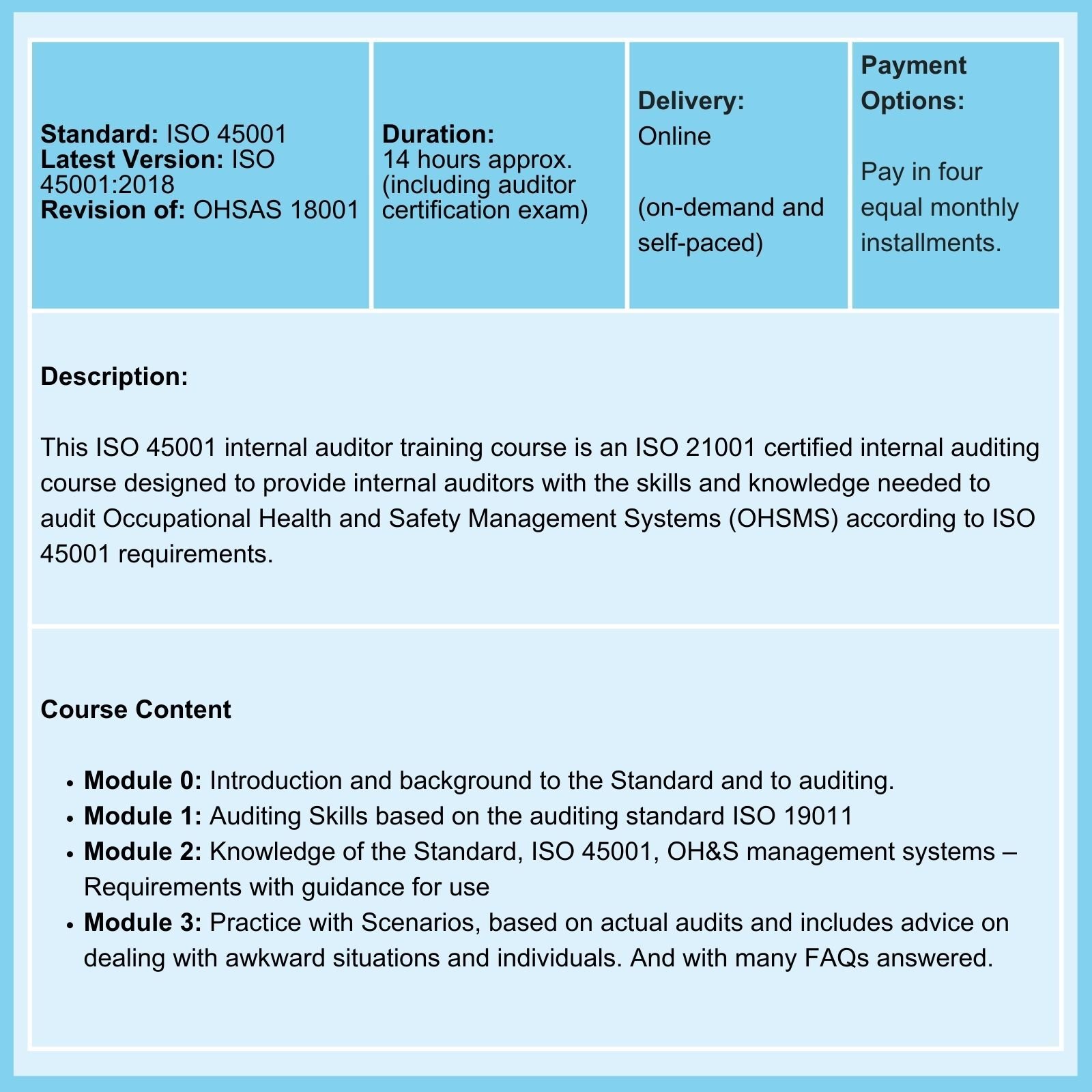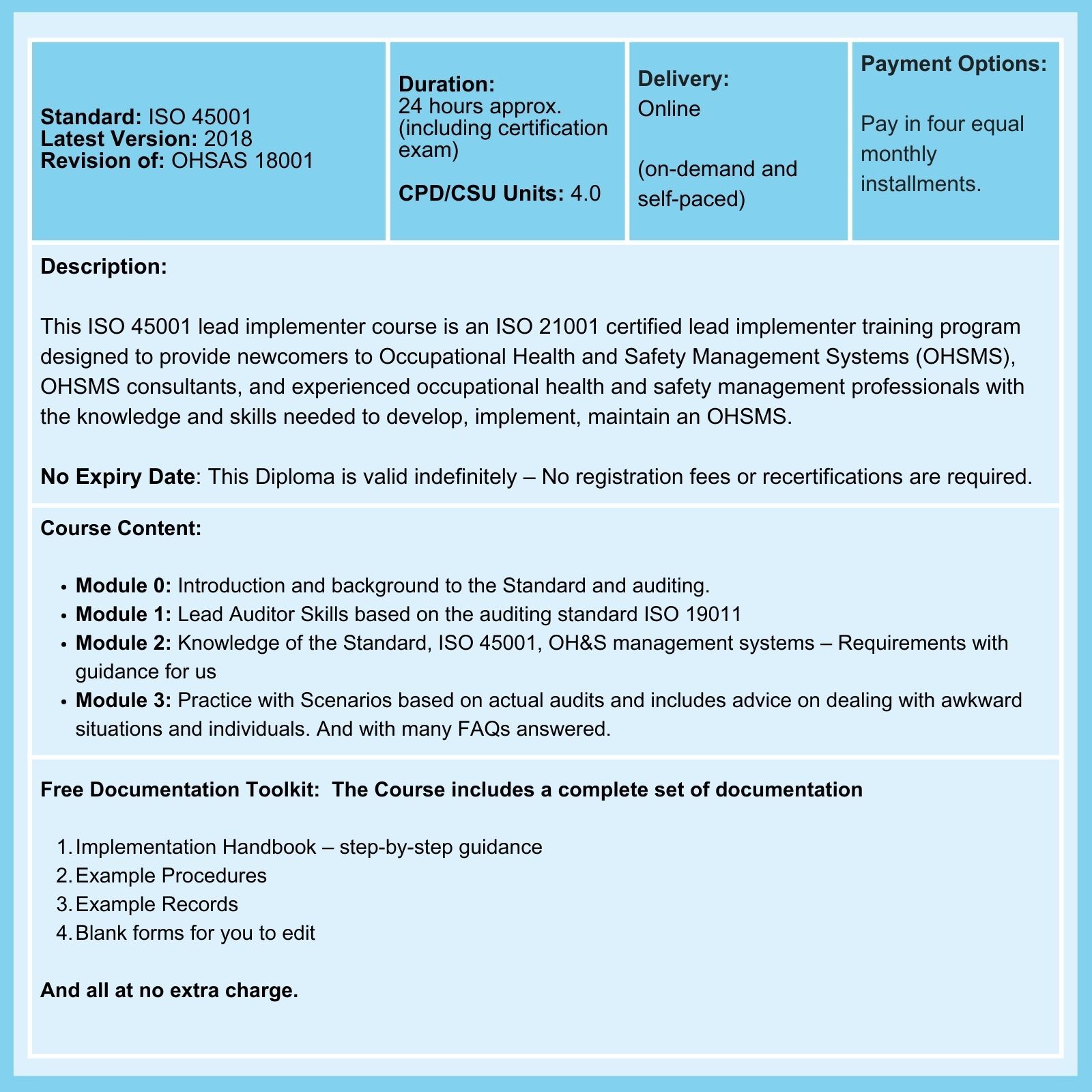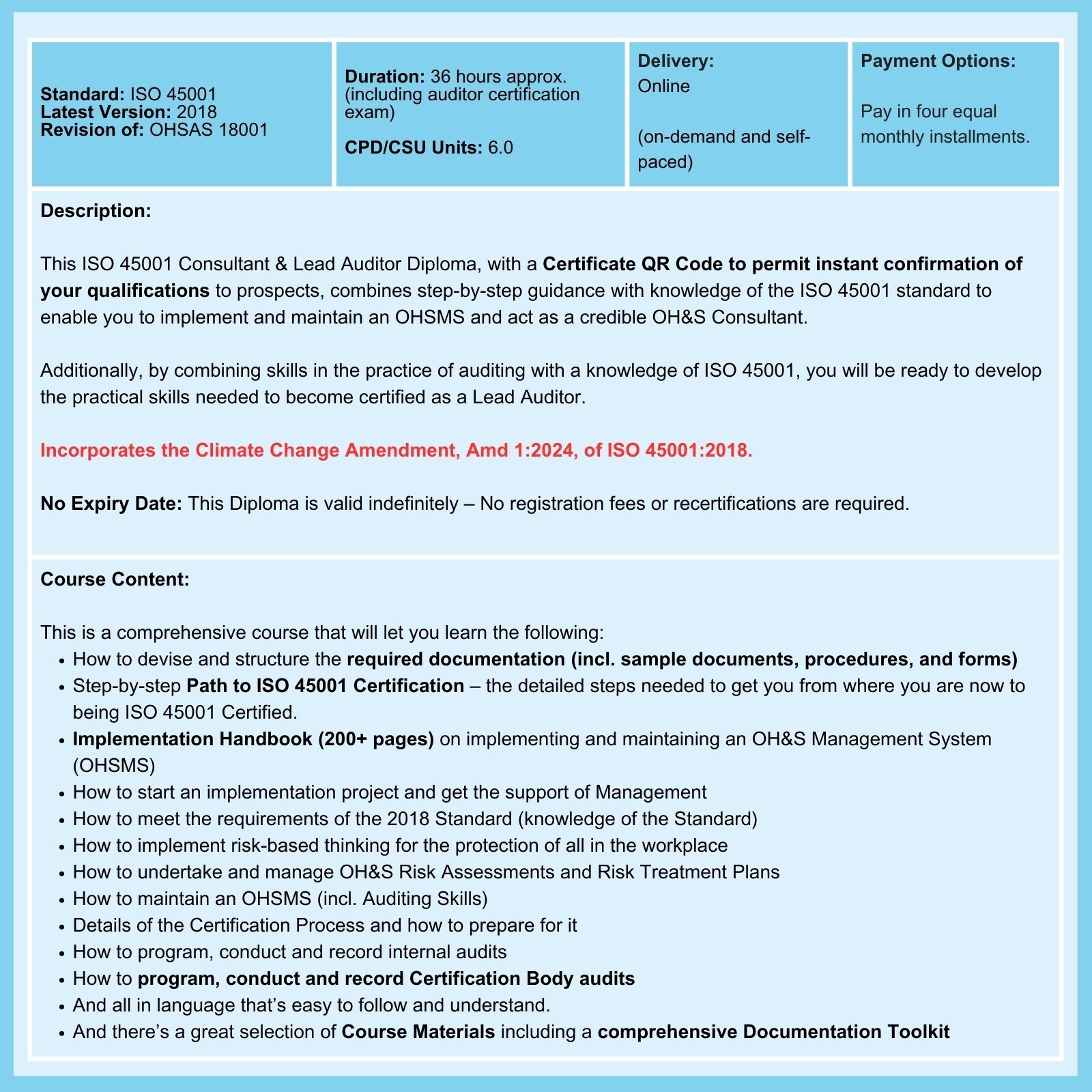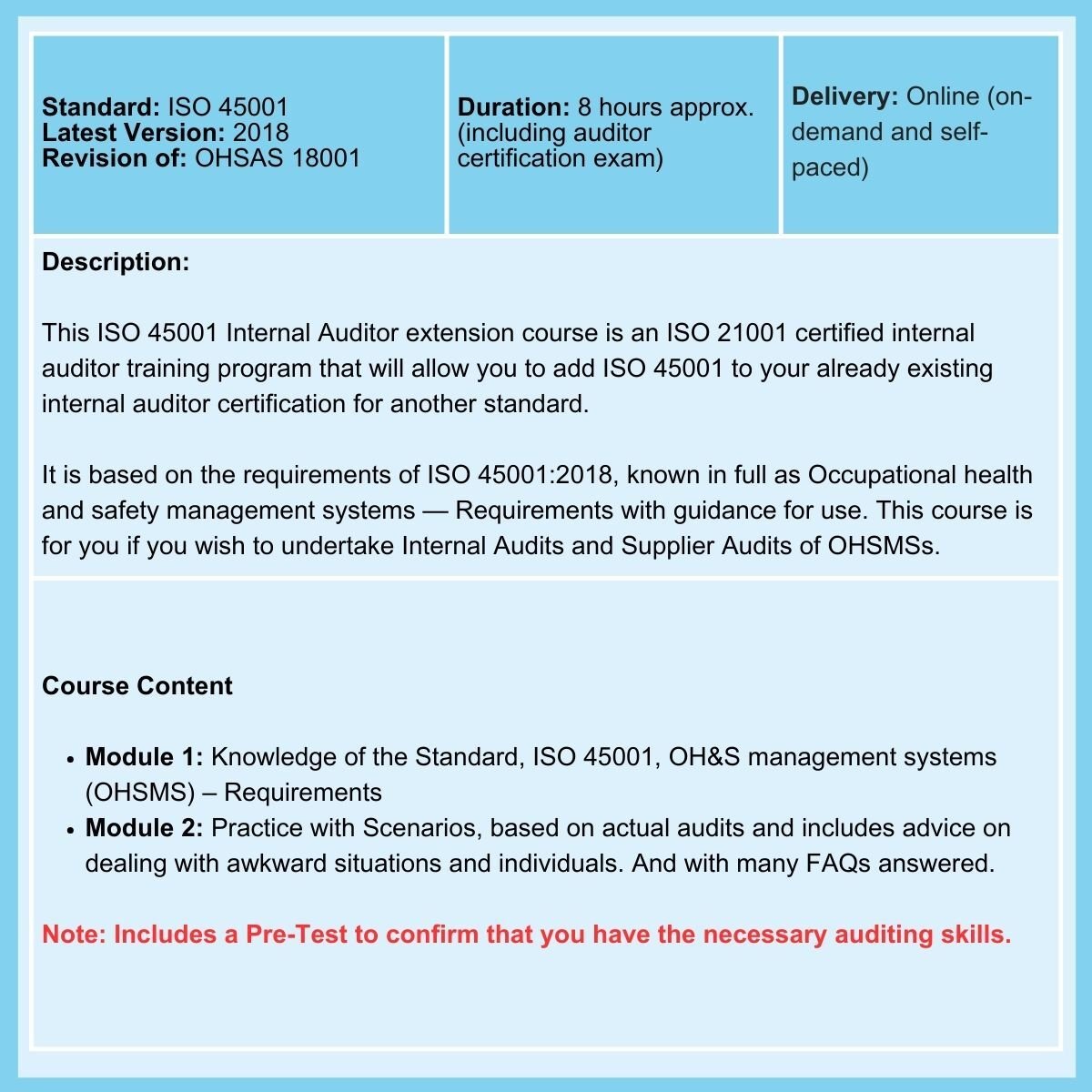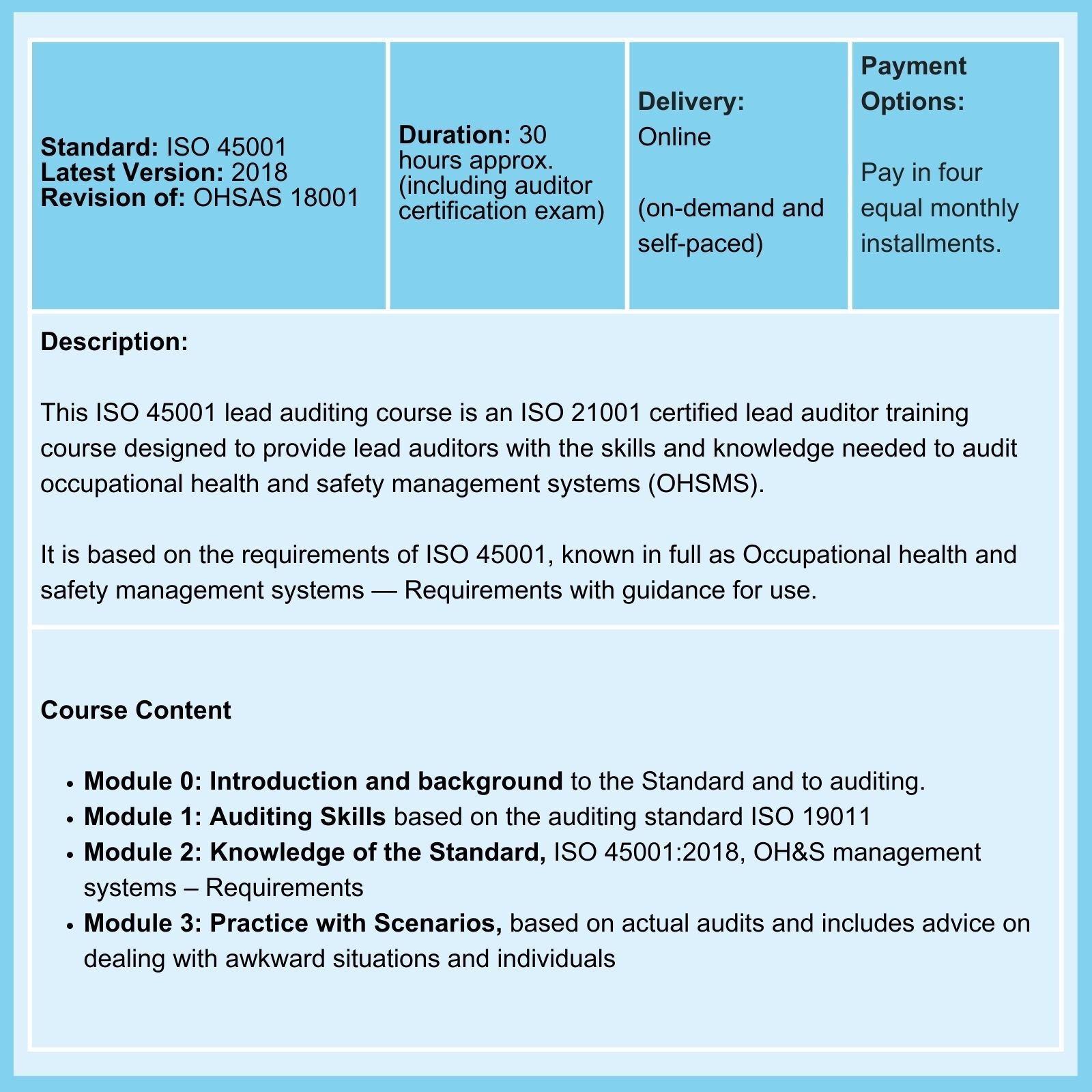
That said, the path to compliance can often appear intimidating, especially when first presented with complex documentation requirements. ISO 45001 itself does not require specific documents.
Still, it outlines requirements for establishing and maintaining an occupational health and safety management system (OHSMS), including the types of ISO 45001 documents you'll need to gather and maintain. Let’s go over some examples below.
Documents for Implementing an ISO 45001 Compliant OHSMS
- Organizational Context - Documentation outlining the internal and external factors that may impact an organization's ability to achieve its health and safety objectives.
- Occupational Health and Safety Policy - Documented statement of the organization's commitment to health and safety, including objectives for improvement.
- Records of Consultation and Participation: Documentation of processes for consulting and involving employees and other relevant stakeholders in occupational health and safety matters.
- Risk Assessment and Hazard Identification Records: Documentation of the methods used to identify and assess occupational health and safety risks and hazards within the organization.
- Records of Occupational Health Promotion Activities Documentation related to initiatives fostering employee health and well-being such as wellness program materials, health education records, health screening documentation, etc.
- Objectives and Targets: - Documentation of the organization's occupational health and safety objectives and targets, including plans for achieving them.
- OHSMS Manual: - A documented manual that provides an overview of the organization's occupational health and safety management system, including its processes and procedures.
- Records of Management of Change (MoC) - Documentation related to managing processes, equipment, or organizational structure changes that may impact occupational health and safety.
- Supplier and Contractor Management Records: Documentation of processes for selecting, evaluating, and monitoring the performance of suppliers and contractors regarding health and safety.
- Emergency Preparedness and Response Plans: - Documentation of plans and procedures for responding to emergencies and other health and safety incidents.
- Monitoring and Measurement Records: - Documentation of methods used to monitor, measure, and evaluate the performance of the OHSMS and its processes.
- Internal Audit Reports: - Documentation of internal audits conducted to assess the effectiveness of the OHSMS and identify areas for improvement.
- Management Review Records: - Documentation of management reviews conducted to evaluate the performance of the OHSMS, including decisions and actions taken as a result of the evaluation.
ISO 45001 Documentation Toolkit
ISO 45001 Documentation Toolkits are vital for organizations that aim to establish and maintain Occupational Health and Safety Management Systems (OHSMS) that comply with the ISO 45001 standard.
These toolkits, developed by consultants, regulatory bodies, or specialized companies, contain a range of templates, guides, and resources.
Providing clear instructions and ready-made documents simplifies implementation, saving time and resources and reducing workplace accidents. They also promote consistency in OHS practices, facilitate compliance with the ISO standard, and help in ongoing performance assessment.
What does an ISO 45001 Toolkit Contain?
Policy Templates
Policy templates provide standardized formats and clear guidance for creating an effective occupational health and safety (OHS) policy. These templates outline the organization's commitment to workplace safety, employee protection from hazards, and legal compliance. They also offer a systematic framework for setting specific OHS goals and objectives, including risk assessment, treatment, and management principles, emphasizing proactive measures to prevent accidents and injuries.
Procedure Templates
Procedure Templates offer ready-made guides for key processes such as risk assessment, hazard identification, incident reporting, emergency planning, and management review. They provide clear steps and responsibilities for each process, ensuring consistency and compliance with ISO standards. By using these templates, organizations can easily establish effective procedures, making workplaces safer and reducing the chances of accidents.
Form Templates
Form Templates offer ready-to-use documents and checklists for important workplace health and safety tasks. They cover risk assessments, risk treatment plans, audits, corrective actions, training records, and health monitoring. They typically include fields for relevant information, dates, responsible parties, and outcomes, making documentation and progress tracking easier, more transparent, and compliant with ISO 45001.
Manual Templates
Occupational Health and Safety Manual Templates offer guides for creating a detailed document outlining the organization's health and safety management system. They cover aspects like objectives, roles, hazard identification, emergency plans, and incident procedures – using these templates to ensure consistency and clarity in communicating safety practices.
Guidance Documents
ISO 45001 Implementation Handbook and Guidance Documents bridge the gap between the standard's requirements and practical implementation. They translate complex concepts into clear, actionable steps, often incorporating real-world examples. This user-friendly approach helps organizations grasp the nuances of the standard and tailor its application to their unique contexts, enabling them to build robust Occupational Health and Safety Management Systems (OHSMS) that effectively protect the well-being of employees and all in the workplace.
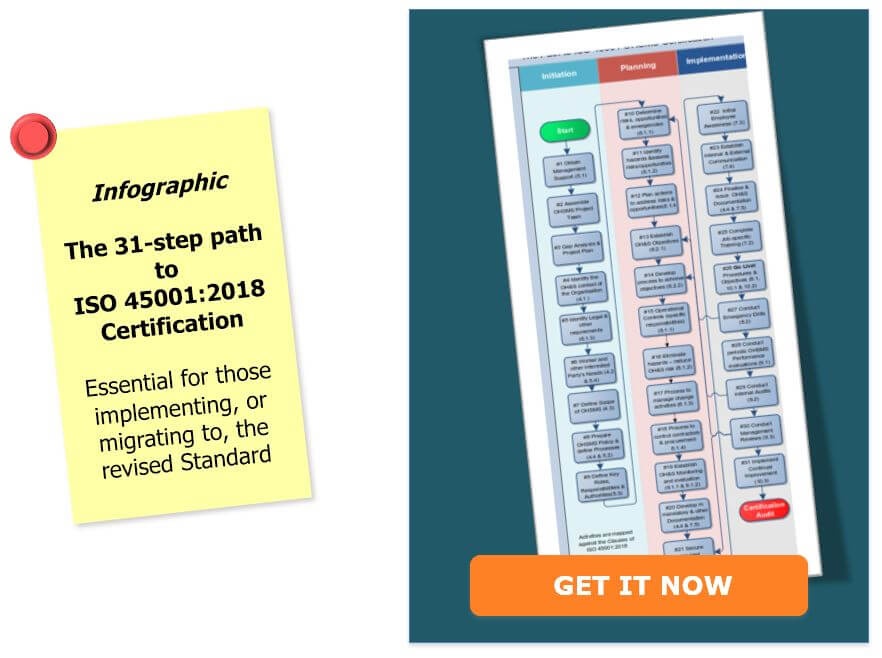
Training Materials
Training Materials consist of slides, presentations, and resources tailored to educate employees, managers, and auditors on ISO 45001 requirements and health and safety topics. Covering various topics like hazard identification, risk assessment, and incident and near-miss reporting, these resources are essential for equipping personnel with the knowledge and skills to effectively contribute to workplace safety.
Examples and Case Studies
These resources provide real-life examples of businesses successfully adopting ISO 45001, demonstrating how they integrated it into their operations. They showcase innovative strategies, problem-solving approaches, and important considerations that led to successful outcomes – encouraging informed decisions and implementing customized solutions that fit the organization's specific needs and circumstances.
Checklists and Gap Analysis Tools
Checklists and gap analysis tools are practical companions for organizations assessing their ISO 45001 compliance by providing structured frameworks to evaluate the organization's health and safety management system against the standard's criteria. This systematic evaluation helps identify areas where practices fall short, allowing for targeted improvements and effective prioritization of corrective actions.
With all of those said, remember that even if ISO 45001 does not directly require specific documents, regulatory authorities or certification bodies may have their own documentation requirements for compliance or certification purposes.
Therefore, organizations should carefully consider their legal obligations and the expectations of relevant stakeholders when developing their Documentation. By using the guidance provided by ISO 45001, you can build a solid safety management system that protects your employees and ensures the long-term success of your organization.

Documentation Guidelines
Documentation guidelines offer organizations valuable insights into establishing solid document control procedures, formatting requirements, and best writing practices for clear and concise policies, procedures, and records. These include tips for version control, document approval processes, and maintaining document integrity over time. By following these guidelines, organizations can ensure consistency, accuracy, accessibility, and compliance with regulatory requirements.
Risk Assessment Tools
Risk assessment tools and templates provide organizations with resources like risk matrices, hazard identification forms, and guidance on evaluating the severity and likelihood of health and safety risks. Organizations can use these resources to improve their understanding of workplace risks, proactively mitigate hazards, and prioritize actions to prevent incidents. Additionally, these tools often include guidance on interpreting assessment results and implementing appropriate risk control measures.
Internal Audit Tools
An ISO 45001 toolkit includes essential tools and templates for planning, conducting, and documenting internal audits of the OHSMS. These tools offer resources like audit checklists, schedules, and report templates, as well as guidance on conducting audits, interpreting findings, and reporting results to management. By using these resources, organizations can systematically evaluate their OHSMS processes, identify areas for improvement, and ensure alignment with ISO 45001 requirements.
Legal Compliance Resources
These resources often include access to legal databases, updates, and compliance guides, ensuring organizations stay current with the latest regulatory requirements. These enable organizations to assess their compliance status, make informed decisions regarding health and safety management, and address regulatory changes and evolving industry standards.
Document Control Software
Some toolkits may include software or online platforms for managing document control processes. These usually offer features like document versioning, approval workflows, and access controls. They also often provide automated notifications and reminders for timely document review and approval. This helps simplify the process of tracking document revisions, facilitating collaboration among stakeholders, and maintaining secure access to critical documents.
Support and Consultation Services
Some providers may offer additional support, consultation, or training services to assist organizations in effectively implementing ISO 45001 and addressing specific challenges or requirements.
These services may include tailored guidance on interpreting ISO 45001 standards, conducting gap analyses, developing customized solutions for unique organizational needs, or conducting specialized training designed to enhance the competency of personnel involved in OHSMS implementation.
With all of those said, remember that even if ISO 45001 does not directly require specific documents, regulatory authorities or certification bodies may have their own documentation requirements for compliance or certification purposes.
Therefore, organizations should carefully consider their legal obligations and the expectations of relevant stakeholders when developing their Documentation. By using the guidance provided by ISO 45001, you can build a solid safety management system that protects your employees and ensures the long-term success of your organization.
 In October 2021, we secured certification to three education-related ISO Standards. We now have a university-grade management system in place conforming to the requirements of…
In October 2021, we secured certification to three education-related ISO Standards. We now have a university-grade management system in place conforming to the requirements of…




